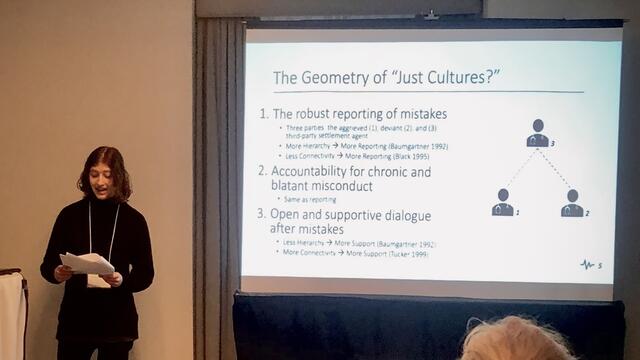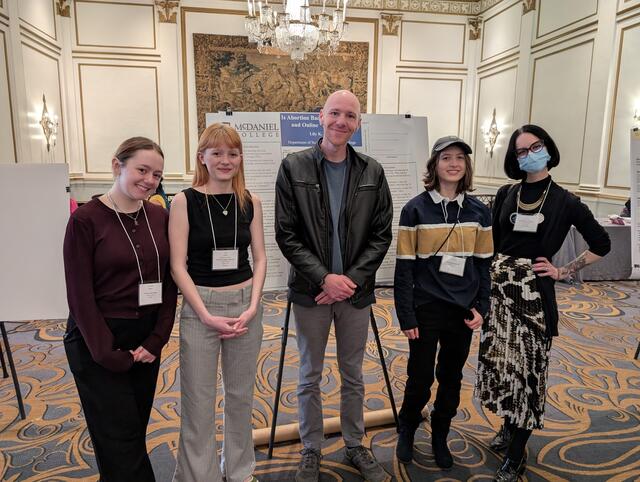Finding health care solutions with sociology
Assistant Professor of Sociology Daniel Boches and sophomore Kaiya Mayhew co-authored an article published in The American Sociologist proposing solutions to increase malpractice reporting among health care practitioners. In March, Mayhew presented the research at the 2025 Eastern Sociological Society Conference in Boston.

In March, sophomore Kaiya Mayhew presented at the 2025 Eastern Sociological Society Conference in Boston on research published in The American Sociologist, which she completed with Assistant Professor of Sociology Daniel Boches.
In January, Assistant Professor of Sociology Daniel Boches, sophomore Kaiya Mayhew, and Mark Cooney of the University of Georgia published “Engineering Pure Sociology” in The American Sociologist.
The study applies sociological theory to health care to offer solutions to improve the management and reporting of medical mistakes. In March, Mayhew presented their findings at the 2025 Eastern Sociological Society Conference in Boston.
“Thousands of mistakes that kill people happen in hospitals every year,” Boches says. “This is a big problem that needs to be solved. Doctors in the health care environment are trying to come up with ideas, but we have the insights on how they can actually solve it.”
The solutions were identified using “social geometry,” which examines how social factors influence certain outcomes — like whether malpractice is reported. Social geometry has also been used to accurately predict the likelihood of legal cases resulting in a death sentence by examining the social factors of offenders and victims, and the social conditions that influence suicide and genocide.
Boches believes sociology — the science of social life — can drive change in the world by tying solutions to proven theory. That’s why he leapt at the opportunity to apply sociology to health care malpractice reporting, which he has previous experience researching.

McDaniel attendees at the 2025 Eastern Sociological Society Conference included sophomore Rennen Dorsey, senior Lily Miller, Boches, Mayhew, and Assistant Professor of Sociology Ginger Berndt (l-r).
How to Encourage Reporting in Hospitals
The recent study was inspired by Boches’ 2023 dissertation, “The social control of medical mistakes.” He interviewed 60 physicians about mistakes they and their colleagues had made and how they were handled. He examined their testimonies to discover which social factors influence malpractice reporting, particularly whether a mistake is handled officially versus informally.
Boches found that the factors influencing reporting include: the authority of the various people involved and the social connections between them. He found that people who were friends with the individual who made a mistake were less likely to report them, compared to when they are interdepartmental colleagues. Discipline was also lighter, and less likely to result in sanctions for individuals who were friendly.
With this background knowledge, Boches, Mayhew, and Cooney propose theory-backed solutions for hospitals to create the social conditions that promote the reporting and fair handling of malpractice.
The researchers’ proposed solutions include:
- Creating reporting systems that are confidential and easy to locate and use.
- Having high-status and familiar settlement agents, like departmental committees. Committees are seen to have greater authority, and forming one within a department means they are seen as more understanding and relevant to the dispute.
- Influencing schedules to increase social distance between individuals, since errors are more often criticized by non-friends than by friends.
- Removing social information from a report to avoid influencing decision-makers. This includes ethnicity, departments, and the reporter’s connection to the errant individual.
The authors also propose adding “error management engineers” to health care settings. These “social engineers” would help implement systems inspired by sociological theories, the way a therapist applies psychological theories.
These suggestions are backed by tested theory but are not prescriptions. “We want to help them make more efficient, effective decisions themselves,” Boches says. “We have some insights to help them accomplish their goals, and that’s what science can do.”
Mayhew, who is now a published sociologist as a sophomore, often discussed social geometry after class with Boches. So, it was an exciting challenge to jump into scholarship about it.
It was her first experience collaborating on a paper, she says, let alone with two sociology experts. In fact, she was working right alongside Cooney, a scholar who had authored her Sociology textbook.
“At the beginning of the process, I was hesitant to make suggestions,” Mayhew says. “By the end, I felt confident adding to the paper. It’s not something that you normally get an opportunity to do in undergrad.”
Sociology Matters for Improving Systems
Within the liberal arts at McDaniel, Sociology faculty and students are uncovering solutions to social issues with data, research, and rigorously tested theories.
Why are these solutions valuable? According to the researchers, changing hospital policies without research to back up them up may not increase the reporting of medical mistakes. If the policies don’t account for the influence of social factors, the systems won’t achieve their full potential.
As Mayhew learned during the research process, data helps people take action and make changes, no matter the setting.
“Something I’ve taken away from this whole process is learning about empirical relationships, or using data to show connections, which I can use moving forward,” Mayhew says.
Since sociology is versatile, the proposed solutions could be applied to other industries, like education and law, to improve the internal reporting of mistakes.
“Through this project, I was introduced to the view of sociology as polishing a tool that others may use to accomplish their goals,” Mayhew says.